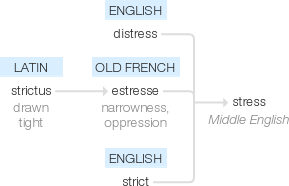Stress
Middle English (denoting hardship or force exerted on a person for the purpose of compulsion): shortening of distress, or partly from Old French estresse ‘narrowness, oppression’, based on Latin strictus ‘drawn tight’ (see strict).
wiktionary
From a shortening of Middle English destresse, borrowed from Old French destrecier, from Latin distringō(“to stretch out”). [1] This form probably coalesced with Middle English stresse, from Old French estrece(“narrowness”), from Vulgar Latin *strictia, from Latin strictus(“narrow”).
In the sense of "mental strain" or “disruption”, used occasionally in the 1920s and 1930s by psychologists, including Walter Cannon (1934); in “biological threat”, used by endocrinologist Hans Selye, by metaphor with stress in physics (force on an object) in the 1930s, and popularized by same in the 1950s.
etymonline
stress (n.)
c. 1300, "hardship, adversity, force, pressure," in part a shortening of Middle English distress (n.); in part from Old French estrece "narrowness, oppression," from Vulgar Latin *strictia, from Latin strictus "tight, compressed, drawn together," past participle of stringere "draw tight" (see strain (v.)). Meaning "physical strain on a material object" is from mid-15c. As an abstract force in mechanics from 1855. The purely psychological sense is attested from 1955.
stress (v.)
c. 1300, stressen, "to subject (someone) to force or compulsion," a short form of distress (v.), or else from Old French estrecier, estrescer, from Vulgar Latin *strictiare, from Latin stringere "draw tight," which also is the source of stress (n.). The figurative meaning "put emphasis on" is first recorded 1896, from notion of laying pressure on something by relying on it. Related: Stressed; stressing.
